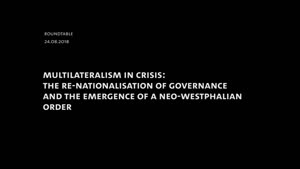Multilateralism in Crisis: The Re-Nationalisation of Governance and the Emergence of a Neo-Westphalian Order - Prof. Andreas von Staden, Prof. Dr. Amrita Narlikar, Prof. Marlene Wind, Laurence R. Helfer - University of Hamburg
- Lecture2Go
- Catalog
- F.2 - Wirtschafts- und Sozialwissenschaften
- Sozialwissenschaften
- ECPR 2018 General Conference
Catalog
Multilateralism in Crisis: The Re-Nationalisation of Governance and the Emergence of a Neo-Westphalian Order
Video
Roundtable
Expanding in numbers and competences for most of the post-Cold-War era, multilateral governance institutions at the regional and global level have come under stress in recent years as member states and political movements within them increasingly seek to redefine their jurisdictions, to repatriate some or all regulatory competences to the nation-state, or to recalibrate the exercise of their decision-making authority. The exit of the United Kingdom from the European Union may be the most prominent example of this development, but similar trends are observable across regions, institutions, and issue areas: The current US administration has thrown into doubt the United States’ commitment to various governance arrangements, including NAFTA the WTO, and the UN; Latin American states have been assembling under the roof of UNASUR, an organisation that makes even less pretensions to becoming a supranational organisation than did its precursors in the region; several African states are withdrawing from the International Criminal Court while members of the South African Development Community have significantly curtailed the jurisdiction of the SADC tribunal after it had forayed into sensitive political territory in one of its very first cases; and with respect to the European Court of Human Rights, member states have moved to enshrine the principle of the margin of appreciation that foregrounds state discretion formally in the European Convention on Human Rights. Last but not least, nationalist parties and political movements that are at best critical, at worst hostile to existing forms of governance beyond the state have been in ascendance across countries and continents.
Some adjustments of the design and operation of international regimes as well as some fluctuation in the membership of international organisations has always taken place and is not per se inimical to global governance, but the cumulation of political positions the world over that express a preference for building back the existing governance architecture to unshackle nation-states, at least in part, from what are perceived as undue interferences with national sovereignty and interests is a development that has become particularly noticeable over the last ten or so years. This Roundtable will address the causes and consequences of this move away from multilateralism and towards greater emphasis again on the role of the nation-state as the principal unit of decision-making, for problems arising within states as well as for externalities that affect neighbouring states and, possibly, the globe.
Video production: eLearning-support at the faculty of business, economics and social sciences



